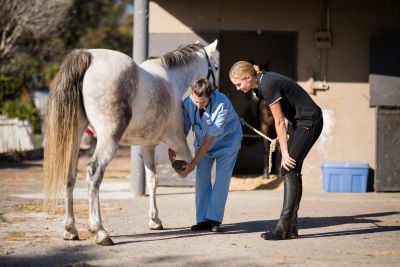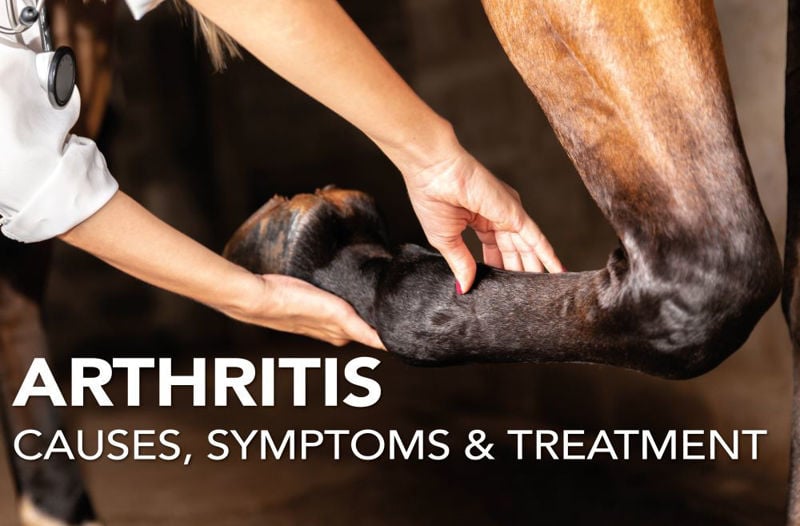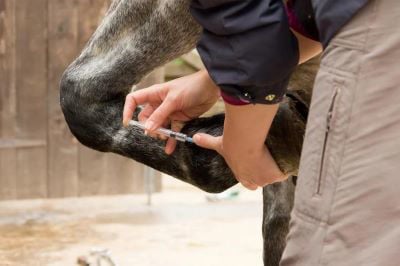What is Arthritis in horses?
Arthritis, also known as osteoarthritis or degenerative joint disease (DJD), is a painful and progressive condition that affects the joints due to cartilage degeneration and loss. In simple terms, arthritis refers to the inflammation of a joint, which leads to discomfort, stiffness, and reduced mobility.
For horses, joint stress from exercise and repetitive movements over time is believed to be a primary cause of arthritis. As the horse ages, joint structures can develop scarring, and the articular cartilage wears down, often due to a decrease in synovial fluid production. While arthritis is more common in older horses, it can affect horses of all ages. Understanding equine joint health is crucial to managing arthritis and preventing further damage.
Other types of Arthritis in Horses: Septic and Bone Spavin
Septic Arthritis:
This is arthritis caused as a result of an infection. Bacteria from another part of the body spread through the blood stream is the most common stem for infection, but microorganisms may also enter through a wound. It is generally more common in foals as a result of inadequate maternal antibodies from colostrum, and reportedly the most common cause of mortality in foals less than 7 days old. Treatment involves antibiotics and flushing the joint with a sterile solution to remove the bacteria.
Bone Spavin:
Bone spavin is the term given to describe arthritis that is typically affecting the two lowest joints in the hock. Similarly to other joints affected by arthritis, it is believed to be a result of excessive wear and tear on the hock joints.
Signs of arthritis in horses
Symptoms of arthritis in horses can vary, but mostly include:
- Lameness
- Swelling around the joint
- Reduced range of motion of the affected joint
- A change in joint conformation
Diagram showing a healthy joint vs an arthritic joint
How to diagnose arthritis in horses
Early diagnosis is key for a promising prognosis. Therefore, it is important you consult your vet promptly at the early signs, such as minor lameness or swelling of the joint.
Firstly, the vet will need to see the horse move. This is often done in hand, at trot on a hard surface in both straight lines and turning a circle each way. The vet will palpate the limb for heat and swelling and may carry out a flexion test.
Following the initial examination and once the vet has identified the affected joint, a nerve block may be carried out, followed by further diagnostic methods.
The most frequently used method for diagnosing arthritis is radiographs (x-rays), however the vet may also use nuclear scintigraphy, arthroscopy, synovial fluid analysis, and ultrasound to diagnose arthritis in your horse.

Vet examining a horse's foreleg
How to Manage Arthritis in Horses
If you are concerned about your horse showing signs of arthritis, it is crucial to seek prompt veterinary care. Early diagnosis and treatment significantly improve the prognosis, helping to manage the condition more effectively.
Arthritis management varies depending on the individual horse and the stage of progression. Since this is a progressive condition with no known cure, the goal is to keep the horse comfortable and slow the rate of joint degeneration. Often, a combination of rest, medication, and supportive therapies can alleviate symptoms. Common veterinary treatments include nonsteroidal anti-inflammatory drugs (NSAIDs), intra-articular corticosteroids, or hyaluronic acid injections. Alternative therapies, such as acupuncture or shockwave therapy, may also provide relief and improve mobility.
Exciting research is underway to develop advanced treatments for equine arthritis. These include blood analysis for early detection of joint degeneration and innovative approaches like laboratory-grown tissue to regenerate damaged cartilage.
Vet injecting into horses leg
For any advice or questions you may have, please don't hestiate to reach out to our expert nutrition team. You can call 0800 585525 Monday-Friday 8:30am-5:00pm. Email [email protected], or send us a DM on social media.




